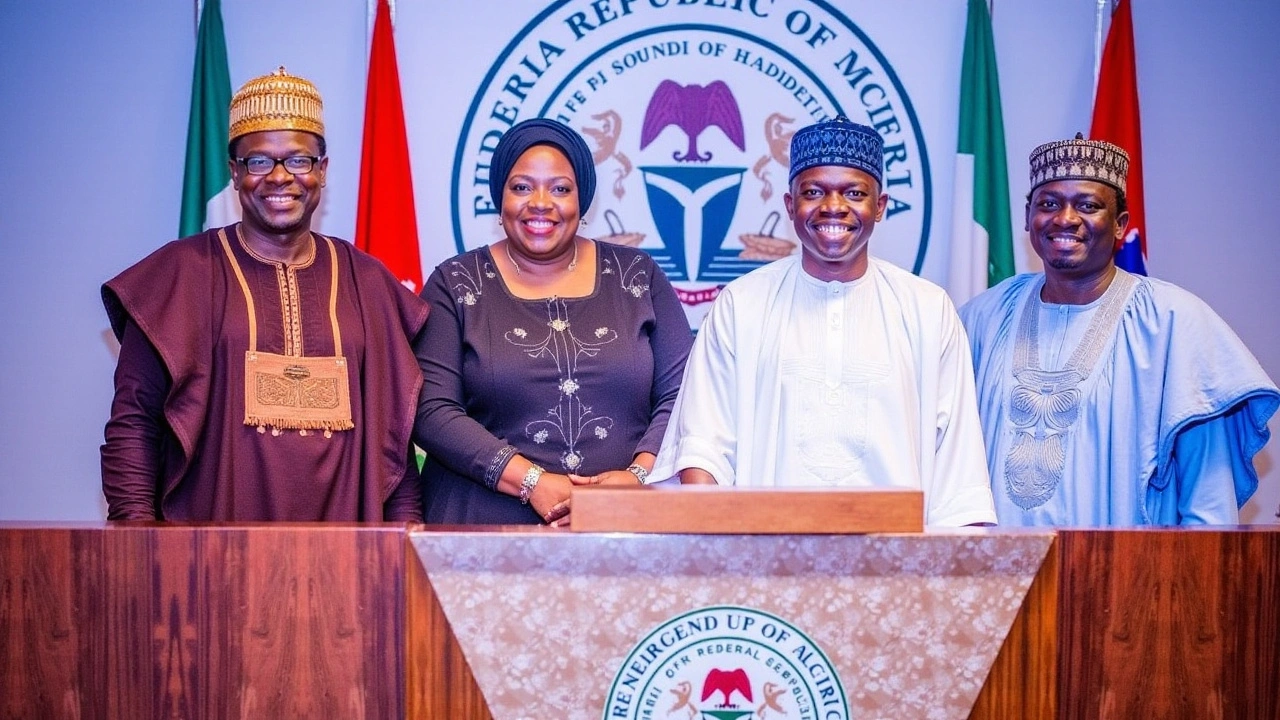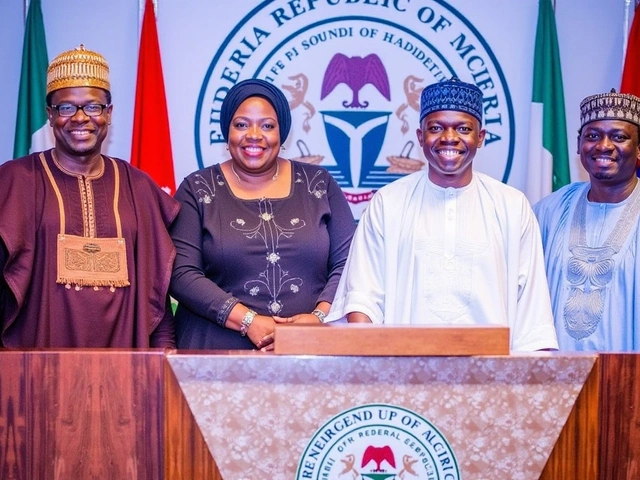Justice Kudirat Kekere-Ekun Vows to Restore Confidence in Nigerian Judicial System
In a significant ceremony held at the Council Chamber of the State House in Abuja, Justice Kudirat Kekere-Ekun has taken the oath of office as the acting Chief Justice of Nigeria. Her pledge to restore trust in the country’s judicial system marks a critical moment, not just for her but for the entire nation. As she stood before a distinguished gathering including President Bola Tinubu and other high-ranking officials, the weight of her words was palpable.
Justice Kekere-Ekun, who succeeds the retired Chief Justice Olukayode Ariwoola, steps into her new role at a time when the judiciary is under intense scrutiny. Judicial integrity and efficiency have been top concerns for citizens yearning for a system that truly upholds justice. At 66 years old, she will serve until her retirement in 2028, and she has expressed strong intentions to address these concerns comprehensively.
A Collective Responsibility
“This task is not mine alone,” Kekere-Ekun declared, emphasizing that restoring trust in the judiciary is a collective responsibility that requires contributions from every Nigerian. Her call to action was direct and inspiring, urging citizens to embrace a more transparent and fair approach to justice. She pointed out that systemic changes must be supported by individual commitments to integrity and fairness.
While she stands at the helm of the judiciary, Kekere-Ekun acknowledges the pressing need for reforms that reach down to every level of the judicial process. Her plan includes overhauling the appointment process for judicial officers, which has long been a subject of controversy and discontent. By implementing rigorous standards, she hopes to create an environment where meritocracy prevails over nepotism and favoritism.
Support from Prominent Figures
The ceremony was attended by a host of prominent figures who are crucial to the nation’s governance. Among them were President Bola Tinubu, Senate President Godswill Akpabio, Chief of Staff to the President Femi Gbajabiamila, and National Security Adviser Nuhu Ribadu. Their presence underscored the importance of this transition in leadership for the judiciary. Also in attendance were retired CJN Justice Olukayode Ariwoola, members of the National Judicial Council, and representatives from the Nigerian Bar Association, all of whom play key roles in the legal framework of Nigeria.
Having the backing of such influential leaders is crucial for Kekere-Ekun’s mandate. It sends a message that the restoration of faith in the judicial system is a priority at the highest levels of government. The collaborative effort between the judiciary and other branches of government could pave the way for substantial and enduring reform.
Expectations and Reforms
As she takes on this daunting task, Justice Kekere-Ekun has laid out a vision that is both ambitious and necessary. She has vowed to focus on several key areas that have long plagued the judiciary. Among them is the issue of undue delays in the adjudication process. Delayed justice, she noted, is tantamount to denied justice. By implementing more efficient case management techniques and fostering a culture of punctuality and diligence, she aims to speed up the resolution of cases.
Moreover, Kekere-Ekun is keen on tackling corruption within the judiciary. Transparency measures, she stated, would be significantly bolstered under her tenure. She proposed periodic audits and stringent anti-corruption policies as part of a broader strategy to weed out unethical practices. Collaborating with anti-corruption agencies will also be a part of her multifaceted approach to instill confidence in judicial proceedings.
Reinvigorating the Judiciary
Her pledge to reform the appointment process for judicial officers stands as one of the cornerstones of her agenda. By establishing more rigorous criteria and ensuring a fair selection process, Kekere-Ekun hopes to cultivate a judiciary composed of the most qualified and honorable individuals. This move is intended to reassure the public that those entrusted with upholding the law are selected based on their competence and integrity.
Public confidence in the judiciary, according to Kekere-Ekun, will significantly improve as citizens witness consistent and fair judgments. When people perceive that justice is not only being done but is indeed being seen to be done, the trust deficit will naturally diminish. This paradigm shift, she believes, is essential for the societal and economic development of Nigeria.
A Nationwide Impact
During her speech, Kekere-Ekun emphasized that the judiciary’s renewal is not an isolated effort but one that benefits every aspect of Nigerian life. From boosting foreign investment to maintaining social order, a trustworthy judicial system is a cornerstone of a healthy and thriving society. She urged Nigerians to actively support these reforms, stressing that their success depends on widespread participation and vigilance.
Kekere-Ekun’s promise to serve with diligence and integrity was met with applause and optimism. Her history of rulings and judicial service suggests she possesses the acumen and dedication necessary for such a transformative role. The road ahead is undoubtedly challenging, but her commitment offers a beacon of hope for those who have long felt disillusioned by judicial shortcomings.
Looking Ahead
In conclusion, Justice Kudirat Kekere-Ekun’s ascension to the role of acting Chief Justice comes at a pivotal time for Nigeria. Her emphasis on collective responsibility and her focus on crucial reforms present a realistic blueprint for restoring faith in the judicial system. If her early declarations are anything to go by, Nigeria might be on the cusp of a judicial renaissance, with far-reaching benefits for the nation and its people.








Mala Strahle
August 24, 2024 AT 00:26The appointment of Justice Kudirat Kekere‑Ekun marks a pivotal juncture for Nigeria’s legal landscape. In the context of systemic challenges, her vow to restore confidence is both timely and essential. It reflects a broader societal yearning for transparency, accountability, and the rule of law. The collective responsibility she invoked resonates with the philosophical notion that justice is a communal construct, not merely a top‑down decree. By emphasizing meritocracy over nepotism, she aligns with the principle that competence should be the sole gatekeeper to judicial authority. This shift, if operationalized, could cascade into reduced case backlogs by ensuring that judges are both qualified and intrinsically motivated. Moreover, the integration of periodic audits will serve as a feedback loop, detecting and correcting deviations before they become entrenched. The cooperation with anti‑corruption agencies underscores an interdisciplinary approach, recognizing that the judiciary does not exist in isolation. Such collaboration could mitigate the perception of impunity that has plagued the system for years. The emphasis on punctuality and efficient case management is also a nod to the adage that delayed justice is denied justice. Implementing technology‑driven docket systems could further accelerate filings and rulings, creating a more responsive environment for litigants. While reforms are commendable, their success hinges on sustained political will beyond the ceremonial applause. The presence of senior officials at the oath‑taking ceremony signals initial support, yet ongoing legislative backing will be indispensable. In addition, nurturing a culture of ethical conduct among lower court officials will reinforce the top‑down reforms, ensuring that standards are uniformly upheld. Ultimately, if Justice Kekere‑Ekun’s vision is actualized, it could restore public trust, attract foreign investment, and reinforce Nigeria’s democratic foundations.
shubham garg
September 16, 2024 AT 04:16Great news! It's uplifting to see such a strong leader stepping up. Hope the reforms roll out fast!
LEO MOTTA ESCRITOR
October 9, 2024 AT 08:40The path ahead may be winding, but with a collective mindset, progress is inevitable. Embracing change as a shared journey can soften the rough edges of bureaucracy. It's encouraging to imagine a judiciary that mirrors the ideals we cherish.
Sonia Singh
November 1, 2024 AT 12:03Absolutely, the momentum is palpable and collaborative effort will keep it alive.
Ashutosh Bilange
November 24, 2024 AT 16:26OMG this is like the biggest legal drama ever-finally sum real justice hype!!!